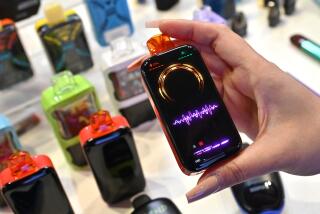FDA looks to regulate tobacco products -- but not electronic cigarettes
- Share via
By late March, tobacco companies will have to reveal to the Food and Drug Administration what sorts of new additives they’ve recently put in their products. But the ruling doesn’t apply to electronic cigarettes, whose makers are locked in legal battle with the FDA.
Meanwhile, the e-cigs are starting to gain a pop-culture foothold – in the fall film “The Tourist,” actor Johnny Depp extols the devices’ virtues to Angelina Jolie, and Katherine Heigl showed up recently on the “Late Show with David Letterman” smoking the e-cigarette indoors. “Bet I’m freaking you all out right now, huh?” she asked the audience as she took a drag.
Manufacturers say electronic cigarettes, which deliver a spray of nicotine, do not fill lungs with tar, stain teeth or smell. They can deliver a heavy or light dose of nicotine, proponents say. They can be legally smoked indoors in public venues. Some argue they might be used as an alternative to the patch or nicotine gum as a way to quit smoking altogether.
But issues abound, according to this Healthy Skeptic column. No one yet knows if e-cigarettes are more or less effective than, say, gums or patches, because they haven’t been independently scientifically tested for this, some experts say. And some studies show the electronic cigarettes don’t deliver any significant amount of nicotine to a person’s bloodstream.
In a Q&A, the Food and Drug Administration makes its concerns clear:
“When FDA conducted limited laboratory studies of certain samples, FDA found significant quality issues that indicate that quality control processes used to manufacture these products are substandard or non-existent. FDA found that cartridges labeled as containing no nicotine contained nicotine and that three different electronic cigarette cartridges with the same label emitted a markedly different amount of nicotine with each puff.”
Meanwhile, even though the FDA has warned that many such cigarettes do contain dangerous chemicals, an appeals court recently ruled that the devices should be treated like other tobacco products.
For more information, see the FDA’s page on electronic cigarettes.







